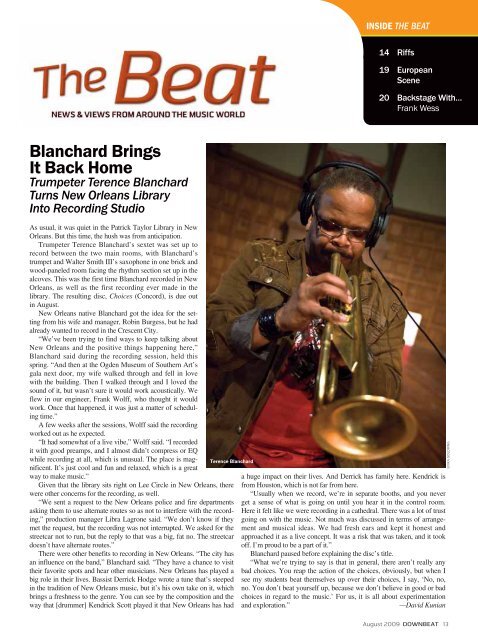Download - Downbeat
Download - Downbeat
Download - Downbeat
- No tags were found...
Create successful ePaper yourself
Turn your PDF publications into a flip-book with our unique Google optimized e-Paper software.
INSIDE THE BEAT14 Riffs19 EuropeanScene20 Backstage With…Frank WessBlanchard BringsIt Back HomeTrumpeter Terence BlanchardTurns New Orleans LibraryInto Recording StudioAs usual, it was quiet in the Patrick Taylor Library in NewOrleans. But this time, the hush was from anticipation.Trumpeter Terence Blanchard’s sextet was set up torecord between the two main rooms, with Blanchard’strumpet and Walter Smith III’s saxophone in one brick andwood-paneled room facing the rhythm section set up in thealcoves. This was the first time Blanchard recorded in NewOrleans, as well as the first recording ever made in thelibrary. The resulting disc, Choices (Concord), is due outin August.New Orleans native Blanchard got the idea for the settingfrom his wife and manager, Robin Burgess, but he hadalready wanted to record in the Crescent City.“We’ve been trying to find ways to keep talking aboutNew Orleans and the positive things happening here,”Blanchard said during the recording session, held thisspring. “And then at the Ogden Museum of Southern Art’sgala next door, my wife walked through and fell in lovewith the building. Then I walked through and I loved thesound of it, but wasn’t sure it would work acoustically. Weflew in our engineer, Frank Wolff, who thought it wouldwork. Once that happened, it was just a matter of schedulingtime.”A few weeks after the sessions, Wolff said the recordingworked out as he expected.“It had somewhat of a live vibe,” Wolff said. “I recordedit with good preamps, and I almost didn’t compress or EQwhile recording at all, which is unusual. The place is magnificent.It’s just cool and fun and relaxed, which is a greatway to make music.”Given that the library sits right on Lee Circle in New Orleans, therewere other concerns for the recording, as well.“We sent a request to the New Orleans police and fire departmentsasking them to use alternate routes so as not to interfere with the recording,”production manager Libra Lagrone said. “We don’t know if theymet the request, but the recording was not interrupted. We asked for thestreetcar not to run, but the reply to that was a big, fat no. The streetcardoesn’t have alternate routes.”There were other benefits to recording in New Orleans. “The city hasan influence on the band,” Blanchard said. “They have a chance to visittheir favorite spots and hear other musicians. New Orleans has played abig role in their lives. Bassist Derrick Hodge wrote a tune that’s steepedin the tradition of New Orleans music, but it’s his own take on it, whichbrings a freshness to the genre. You can see by the composition and theway that [drummer] Kendrick Scott played it that New Orleans has hadTerence Blancharda huge impact on their lives. And Derrick has family here. Kendrick isfrom Houston, which is not far from here.“Usually when we record, we’re in separate booths, and you neverget a sense of what is going on until you hear it in the control room.Here it felt like we were recording in a cathedral. There was a lot of trustgoing on with the music. Not much was discussed in terms of arrangementand musical ideas. We had fresh ears and kept it honest andapproached it as a live concept. It was a risk that was taken, and it tookoff. I’m proud to be a part of it.”Blanchard paused before explaining the disc’s title.“What we’re trying to say is that in general, there aren’t really anybad choices. You reap the action of the choices, obviously, but when Isee my students beat themselves up over their choices, I say, ‘No, no,no. You don’t beat yourself up, because we don’t believe in good or badchoices in regard to the music.’ For us, it is all about experimentationand exploration.”—David KunianERIKA GOLDRINGAugust 2009 DOWNBEAT 13
















